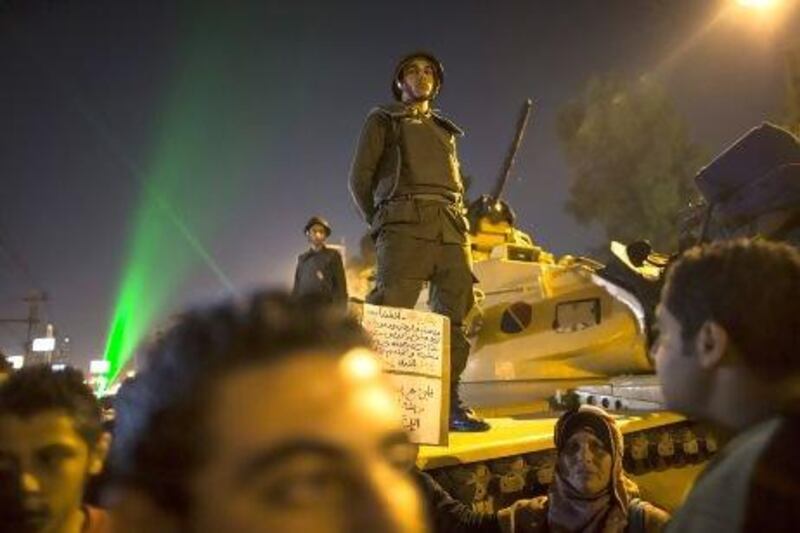CAIRO // Erratic government by Mohammed Morsi is sowing doubt and mistrust abroad and threatening the new president's ability to achieve desperately needed economic recovery.
A Swiss court has denied Egypt access to crucial documents related to its investigation into Mubarak-era corruption because of Mr Morsi's attempts to interfere with the judiciary.
The court portrayed Egypt under Mr Morsi as a collection of dysfunctional institutions and an overly powerful executive branch willing to overrule the courts.
Mr Morsi plunged Egypt into political turmoil last month when he issued a decree giving himself powers beyond the oversight of the judiciary and protecting a committee writing a new constitution from being dissolved by the courts. The Islamist-dominated committee then rushed through a draft constitution even after more than 20 of its 100 members walked out in protest.
The decree and the constitution, which preliminary results show 56.5 per cent of Egyptians approved in the first of two referendum votes, sparked huge demonstrations by opposition forces.
"The Arab Republic of Egypt is currently facing an internal transition characterised by instability of institutions and unannounced organisational changes," the court ruling said.
It said that even if the constitution were approved in the referendum, "it is difficult to predict how it will be implemented and still leaves many open questions".
The ruling said Mr Morsi's public comments about re-trying Hosni Mubarak before a criminal court, despite a life sentence already imposed for his role in the deaths of protesters during last year's uprising against his regime in June, and the president's "sudden and unpredictable" interference in the judiciary, were other causes for concern.
The decision from Switzerland's supreme court comes after Germany announced it was postponing a plan to write off €240 million (Dh1.17bn) of Egyptian debt because of reservations about Mr Morsi's recent decrees. Egypt also delayed a US$4.8 billion (D17.6bn) loan agreement with the International Monetary Fund because of the political unrest.
Together, the developments indicate that the political turmoil isa beginning to have a serious effect on Egyptian foreign policy and economic recovery efforts.
"The developments in Egypt are not just an internal issue, as this case shows. There is an external effect," said Gretta Fenner Zinkernagel, managing director of the Basel Institute on Governance in Switzerland. "And if the government does not make any progress on the Mubarak corruption cases, then there will be even more problems in Egypt."
The Swiss ruling came after Egypt requested access to a wealth of confidential Swiss banking documents related to members of the Mubarak regime and their confidants. But such access is granted only if Switzerland is confident the information will not be used in any court cases or leaked before legal proceedings in Switzerland have finished.
Tunisia last year won access to similar documents from Switzerland relating to the regime of Zine Al Abidine Ben Ali. But the Swiss supreme court said in a decision on December 12, which was made public on Tuesday, that it was not confident Egypt would uphold its guarantees, particularly after the prosecutor general who signed them, Abdel-Meguid Mahmoud, was ousted as a result of Mr Morsi's November 22 decree.
Hossam El Shazly, a political analyst who has been studying Egypt's international corruption investigations from Switzerland, said the decision would slow down some of Egypt's attempts to recover "stolen" assets from abroad.
"The Swiss Courts are very focused on documents and the letter of the law," he said. "The Egyptian government will have to prove the situation has calmed down before it has a chance to reapply for access."
Germany's development minister, Dirk Niebel, gave a more blunt assessment in an interview this week with the newspaper Berliner Zeitung.
"There is the danger that the dictatorial system of ousted president Mubarak is returning," he said.
Egypt could have used access to the Swiss documents to fill in many of the gaps in its global investigation into corruption cases related to the Mubarak regime. Many top businessmen and government officials in Egypt used Swiss banks to hold their assets. Access to Swiss investigative records would show how these people are connected, which banks they used and what payments they made and received over a number of years.
The denial of access is a stumbling block for Egyptian investigators, who have struggled to find what many believe are tens of billions of dollars worth of stolen assets hidden in offshore companies and bank accounts around the world.
Switzerland has disclosed that it has frozen $755m worth of assets connected to politically involved Egyptians. The total assets frozen in jurisdictions across the world at the request of Egypt amount to about $1.2bn, according to the Illicit Gains Authority in Egypt.
Mr Morsi backtracked on his decree this month, replacing it with a milder version, but the protests have continued through this week as Egyptians prepared to vote in the second round of the constitutional referendum on Saturday. Throughout, Mr Morsi has maintained the decisions were a temporary security measure to protect Egypt from a conspiracy by members of the Mubarak regime.
But even if it passes, establishing a new legal framework for Egypt, opposition forces have pledged to continue protests against the president until the constitution is significantly amended and he stops interfering with the judiciary.
Follow
The National
on
[ @TheNationalUAE ]
& Bradley Hope on
[ @bradleyhope ]





